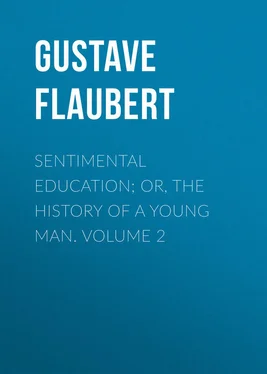Gustave Flaubert - Sentimental Education; Or, The History of a Young Man. Volume 2
Здесь есть возможность читать онлайн «Gustave Flaubert - Sentimental Education; Or, The History of a Young Man. Volume 2» — ознакомительный отрывок электронной книги совершенно бесплатно, а после прочтения отрывка купить полную версию. В некоторых случаях можно слушать аудио, скачать через торрент в формате fb2 и присутствует краткое содержание. Жанр: foreign_antique, foreign_prose, на английском языке. Описание произведения, (предисловие) а так же отзывы посетителей доступны на портале библиотеки ЛибКат.
- Название:Sentimental Education; Or, The History of a Young Man. Volume 2
- Автор:
- Жанр:
- Год:неизвестен
- ISBN:нет данных
- Рейтинг книги:4 / 5. Голосов: 1
-
Избранное:Добавить в избранное
- Отзывы:
-
Ваша оценка:
- 80
- 1
- 2
- 3
- 4
- 5
Sentimental Education; Or, The History of a Young Man. Volume 2: краткое содержание, описание и аннотация
Предлагаем к чтению аннотацию, описание, краткое содержание или предисловие (зависит от того, что написал сам автор книги «Sentimental Education; Or, The History of a Young Man. Volume 2»). Если вы не нашли необходимую информацию о книге — напишите в комментариях, мы постараемся отыскать её.
Sentimental Education; Or, The History of a Young Man. Volume 2 — читать онлайн ознакомительный отрывок
Ниже представлен текст книги, разбитый по страницам. Система сохранения места последней прочитанной страницы, позволяет с удобством читать онлайн бесплатно книгу «Sentimental Education; Or, The History of a Young Man. Volume 2», без необходимости каждый раз заново искать на чём Вы остановились. Поставьте закладку, и сможете в любой момент перейти на страницу, на которой закончили чтение.
Интервал:
Закладка:
According to M. Dambreuse, no good could be attained without a superabundance of capital. Therefore, the only practicable method was to intrust, "as the Saint-Simonians, however, proposed (good heavens! there was some merit in their views – let us be just to everybody) – to intrust, I say, the cause of progress to those who can increase the public wealth." Imperceptibly they began to touch on great industrial undertakings – the railways, the coal-mines. And M. Dambreuse, addressing Frederick, said to him in a low whisper:
"You have not called about that business of ours?"
Frederick pleaded illness; but, feeling that this excuse was too absurd:
"Besides, I need my ready money."
"Is it to buy a carriage?" asked Madame Dambreuse, who was brushing past him with a cup of tea in her hand, and for a minute she watched his face with her head bent slightly over her shoulder.
She believed that he was Rosanette's lover – the allusion was obvious. It seemed even to Frederick that all the ladies were staring at him from a distance and whispering to one another.
In order to get a better idea as to what they were thinking about, he once more approached them. On the opposite side of the table, Martinon, seated near Mademoiselle Cécile, was turning over the leaves of an album. It contained lithographs representing Spanish costumes. He read the descriptive titles aloud: "A Lady of Seville," "A Valencia Gardener," "An Andalusian Picador"; and once, when he had reached the bottom of the page, he continued all in one breath:
"Jacques Arnoux, publisher. One of your friends, eh?"
"That is true," said Frederick, hurt by the tone he had assumed.
Madame Dambreuse again interposed:
"In fact, you came here one morning – about a house, I believe – a house belonging to his wife." (This meant: "She is your mistress.")
He reddened up to his ears; and M. Dambreuse, who joined them at the same moment, made this additional remark:
"You appear even to be deeply interested in them."
These last words had the effect of putting Frederick out of countenance. His confusion, which, he could not help feeling, was evident to them, was on the point of confirming their suspicions, when M. Dambreuse drew close to him, and, in a tone of great seriousness, said:
"I suppose you don't do business together?"
He protested by repeated shakes of the head, without realising the exact meaning of the capitalist, who wished to give him advice.
He felt a desire to leave. The fear of appearing faint-hearted restrained him. A servant carried away the teacups. Madame Dambreuse was talking to a diplomatist in a blue coat. Two young girls, drawing their foreheads close together, showed each other their jewellery. The others, seated in a semicircle on armchairs, kept gently moving their white faces crowned with black or fair hair. Nobody, in fact, minded them. Frederick turned on his heels; and, by a succession of long zigzags, he had almost reached the door, when, passing close to a bracket, he remarked, on the top of it, between a china vase and the wainscoting, a journal folded up in two. He drew it out a little, and read these words — The Flambard .
Who had brought it there? Cisy. Manifestly no one else. What did it matter, however? They would believe – already, perhaps, everyone believed – in the article. What was the cause of this rancour? He wrapped himself up in ironical silence. He felt like one lost in a desert. But suddenly he heard Martinon's voice:
"Talking of Arnoux, I saw in the newspapers, amongst the names of those accused of preparing incendiary bombs, that of one of his employés , Sénécal. Is that our Sénécal?"
"The very same!"
Martinon repeated several times in a very loud tone:
"What? our Sénécal! our Sénécal!"
Then questions were asked him about the conspiracy. It was assumed that his connection with the prosecutor's office ought to furnish him with some information on the subject.
He declared that he had none. However, he knew very little about this individual, having seen him only two or three times. He positively regarded him as a very ill-conditioned fellow. Frederick exclaimed indignantly:
"Not at all! he is a very honest fellow."
"All the same, Monsieur," said a landowner, "no conspirator can be an honest man."
Most of the men assembled there had served at least four governments; and they would have sold France or the human race in order to preserve their own incomes, to save themselves from any discomfort or embarrassment, or even through sheer baseness, through worship of force. They all maintained that political crimes were inexcusable. It would be more desirable to pardon those which were provoked by want. And they did not fail to put forward the eternal illustration of the father of a family stealing the eternal loaf of bread from the eternal baker.
A gentleman occupying an administrative office even went so far as to exclaim:
"For my part, Monsieur, if I were told that my brother were a conspirator I would denounce him!"
Frederick invoked the right of resistance, and recalling to mind some phrases that Deslauriers had used in their conversations, he referred to Delosmes, Blackstone, the English Bill of Rights, and Article 2 of the Constitution of '91. It was even by virtue of this law that the fall of Napoléon had been proclaimed. It had been recognised in 1830, and inscribed at the head of the Charter. Besides, when the sovereign fails to fulfil the contract, justice requires that he should be overthrown.
"Why, this is abominable!" exclaimed a prefect's wife.
All the rest remained silent, filled with vague terror, as if they had heard the noise of bullets. Madame Dambreuse rocked herself in her chair, and smiled as she listened to him.
A manufacturer, who had formerly been a member of the Carbonari, tried to show that the Orléans family possessed good qualities. No doubt there were some abuses.
"Well, what then?"
"But we should not talk about them, my dear Monsieur! If you knew how all these clamourings of the Opposition injure business!"
"What do I care about business?" said Frederick.
He was exasperated by the rottenness of these old men; and, carried away by the recklessness which sometimes takes possession of even the most timid, he attacked the financiers, the deputies, the government, the king, took up the defence of the Arabs, and gave vent to a great deal of abusive language. A few of those around him encouraged him in a spirit of irony:
"Go on, pray! continue!" whilst others muttered: "The deuce! what enthusiasm!" At last he thought the right thing to do was to retire; and, as he was going away, M. Dambreuse said to him, alluding to the post of secretary:
"No definite arrangement has been yet arrived at; but make haste!"
And Madame Dambreuse:
"You'll call again soon, will you not?"
Frederick considered their parting salutation a last mockery. He had resolved never to come back to this house, or to visit any of these people again. He imagined that he had offended them, not realising what vast funds of indifference society possesses. These women especially excited his indignation. Not a single one of them had backed him up even with a look of sympathy. He felt angry with them for not having been moved by his words. As for Madame Dambreuse, he found in her something at the same time languid and cold, which prevented him from defining her character by a formula. Had she a lover? and, if so, who was her lover? Was it the diplomatist or some other? Perhaps it was Martinon? Impossible! Nevertheless, he experienced a sort of jealousy against Martinon, and an unaccountable ill-will against her.
Dussardier, having called this evening as usual, was awaiting him. Frederick's heart was swelling with bitterness; he unburdened it, and his grievances, though vague and hard to understand, saddened the honest shop-assistant. He even complained of his isolation. Dussardier, after a little hesitation, suggested that they ought to call on Deslauriers.
Читать дальшеИнтервал:
Закладка:
Похожие книги на «Sentimental Education; Or, The History of a Young Man. Volume 2»
Представляем Вашему вниманию похожие книги на «Sentimental Education; Or, The History of a Young Man. Volume 2» списком для выбора. Мы отобрали схожую по названию и смыслу литературу в надежде предоставить читателям больше вариантов отыскать новые, интересные, ещё непрочитанные произведения.
Обсуждение, отзывы о книге «Sentimental Education; Or, The History of a Young Man. Volume 2» и просто собственные мнения читателей. Оставьте ваши комментарии, напишите, что Вы думаете о произведении, его смысле или главных героях. Укажите что конкретно понравилось, а что нет, и почему Вы так считаете.












